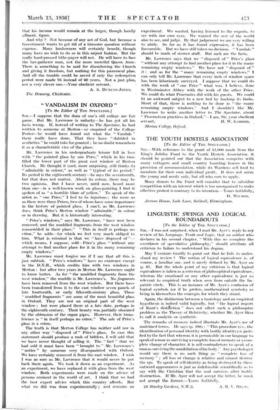LINGUISTIC SWINGS AND LOGICAL ROUNDABOUTS
[To the Editor of Time SPECTATOR."'
was not surprised, when I read Mr. Ayer's reply to my review of his Language, Truth and Logic, that an author who declares in his second chapter, " With this we complete the overthrow of speculative philosophy," should attribute all criticism to failure to understand his dogma.
May I venture timidly to point out that he fails to under- stand my review ? The notion of logical equivalence is. of course, a familiar one, and is nicely defined by Mr. Ayer on p. 67. But the whole point of my criticism is that logical equivalence is taken as a criterion of philosophical equivalence, whereas the emotional or any other equivalence is just as relevant to empirical truth when seen from outside the lin- guistic circle. This is an instance of Mr. Ayers confusion of logical symbols (or if he prefers, mathematical symbols) as being in themselves the concepts for which they stand.
Again, the distinction between a tautology and an empirical, hypothesis is indeed valid logically, but " the logical import of Kant's distinction " does not affect such a philosophic problem as the Theory of Relativity, whether Mr. Ayer likes to call it analytic or synthetic.
The remarks of memory indeed illustrate Mr. Ayer's use of
undefined terms. lie says (p..198) : "This procedure (i.e., the identification of personal identity with bodily identity) is justi- fied by the fact that whereas it is permissible in our language to speak of a man as surviving a complete loss of memory or a coin- plete change of character, it is self-contradictory to speak of.a man as surviving the annihilation of his body." Any psychologiNt would say there is no such thing as " complete loss of, memory " ; all loss or change is relative and cannot destroy the ego. To speak of self-identity as being destroyed by.thesc outward appearances is just as indefensible scientifically as to say with the Christian that the soul survives after bodily destruction. If Mr. Ayer will not accept the latter, he must not accept the former.—Yours faithfully,














































 Previous page
Previous page